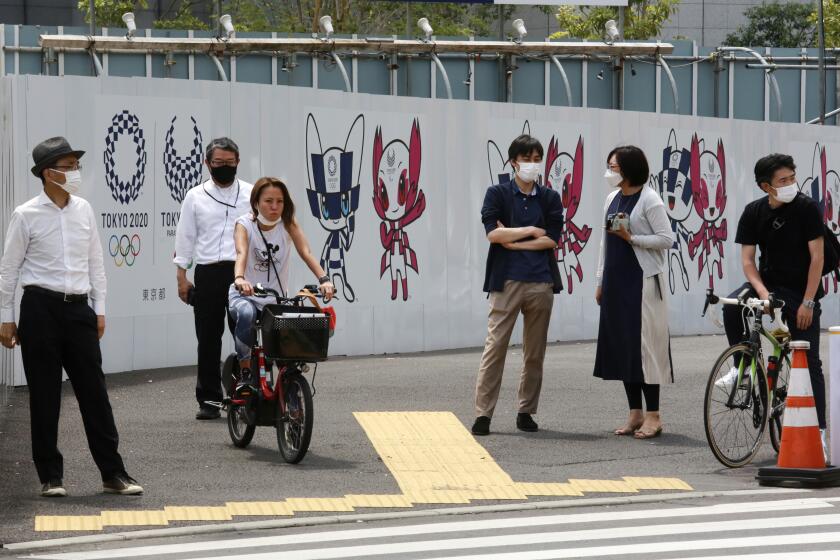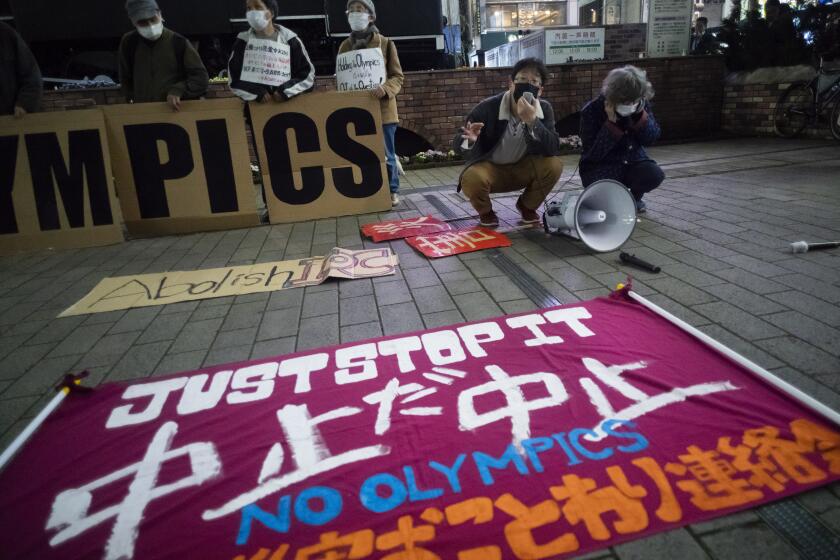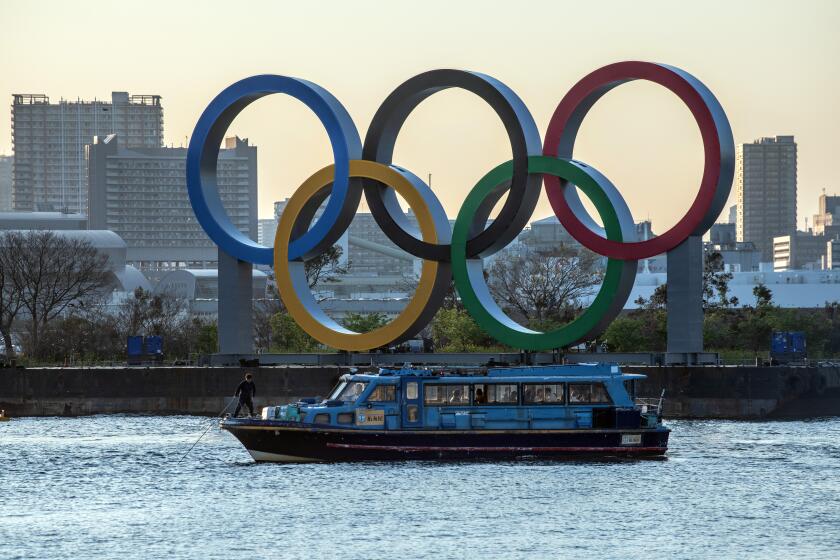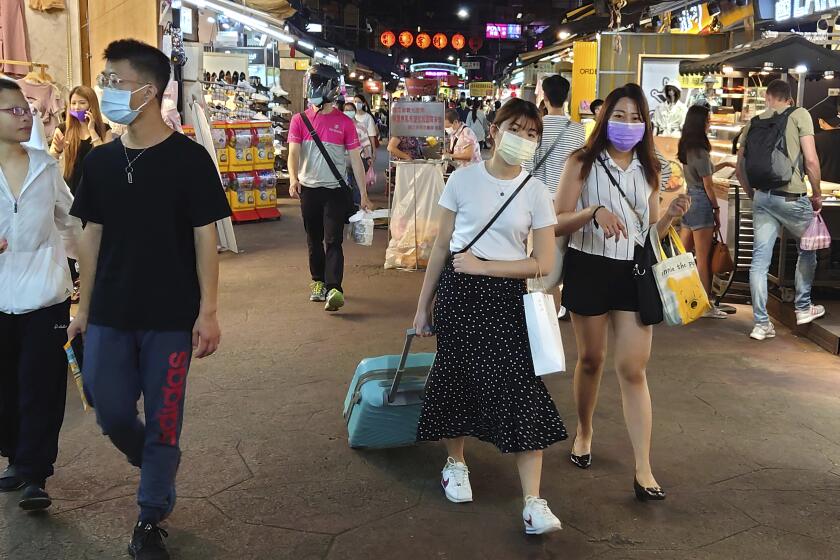Tokyo Olympics loom, with only 2% of Japanese fully vaccinated and fears over thousands of visitors
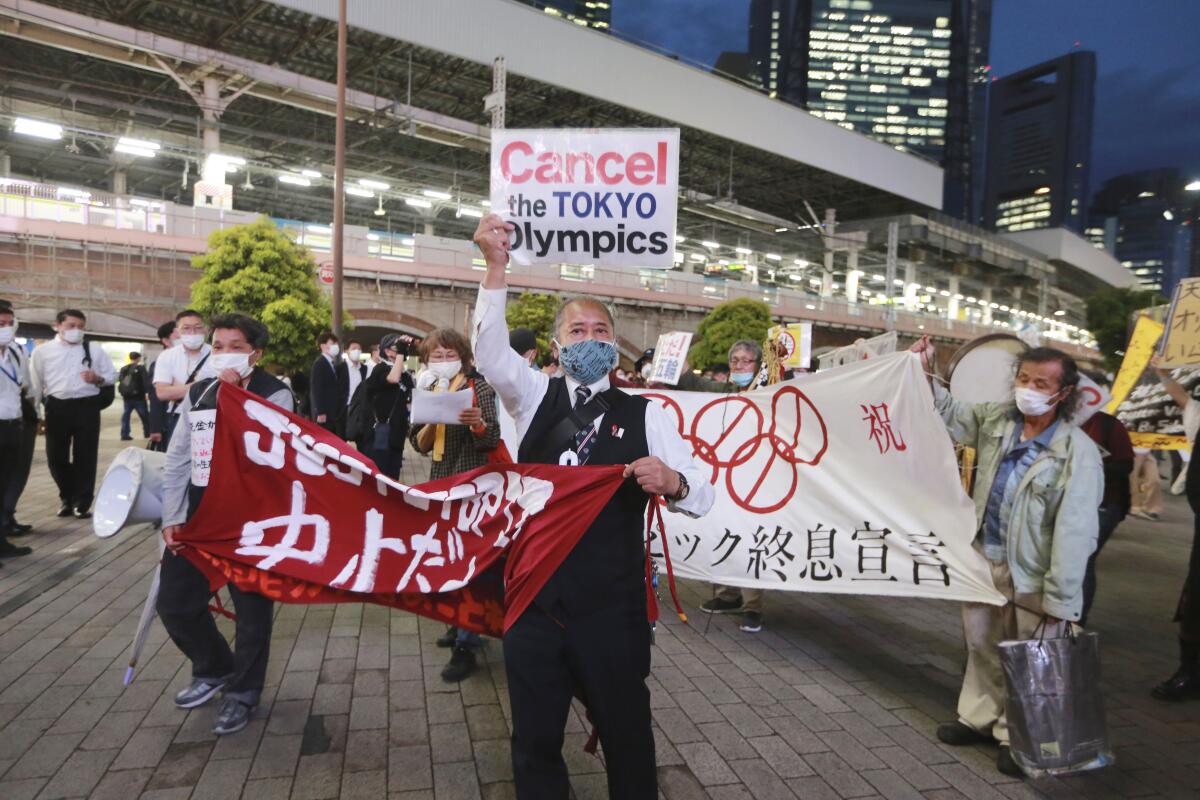
- Share via
TOKYO — Come July, Takahiro Katsumi’s home of Saitama is on deck to host some of the Summer Olympics’ most prominent events, including basketball, soccer and golf.
It’s an alarming prospect for Katsumi, a 48-year-old translator whose wife is battling cancer. He worries that Japan’s healthcare system, already strained from high infection and death rates in a fourth wave of the COVID-19 pandemic, would be overwhelmed if Olympic visitors trigger another surge — leaving his wife even more vulnerable.
To Katsumi, forging ahead with the Tokyo Olympics is an unreasonable risk that will leave the Japanese public shouldering the regret and consequences after the athletes and the world’s spotlight have come and gone.
“Why are we risking our loved ones for this?” he asked. “Why did we not say no?”
With just two months to go until the opening ceremony, much of the Japanese public appears to share Katsumi’s worries.
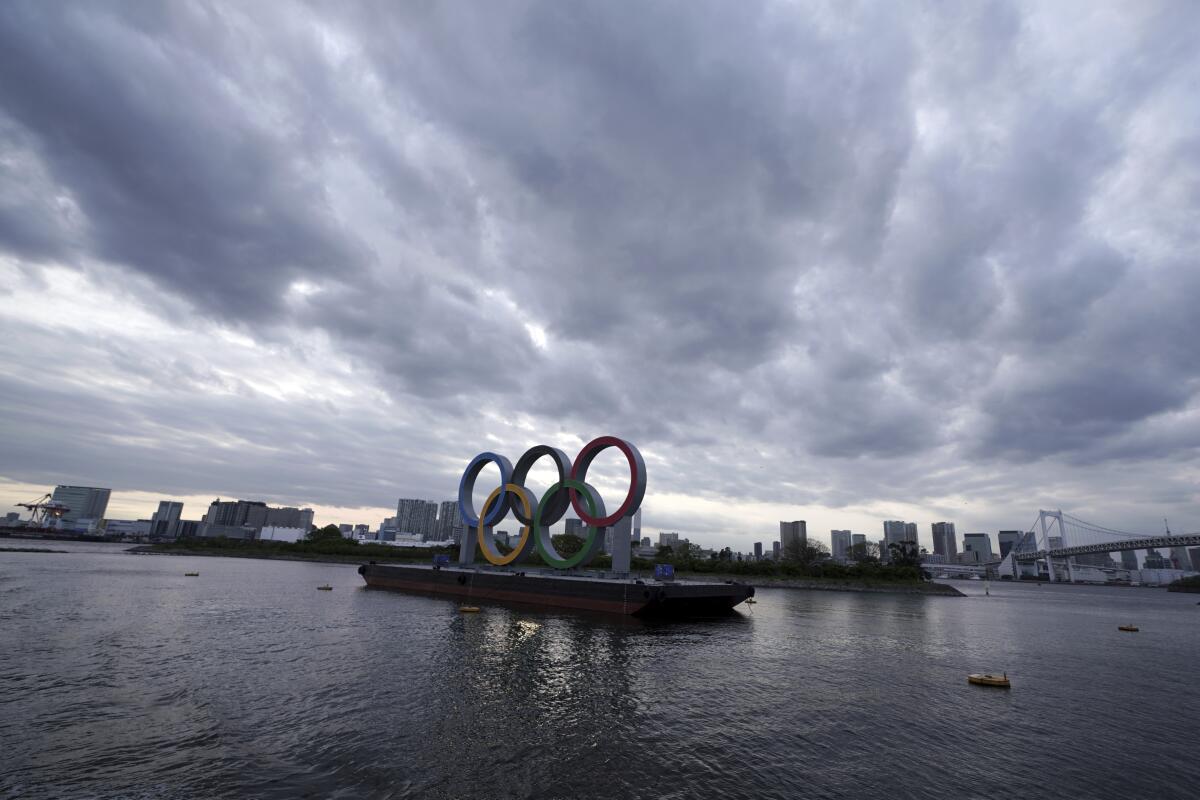
More than 80% of Japanese residents said in recent polls that they want the Games canceled or again postponed. Doctors’ and nurses’ groups say hospitals could not handle another increase in COVID-19 cases and the threat of virus variants coming in from around the world. Japan’s richest man, a beloved tennis star and a top politician have all questioned the wisdom of hosting the Games in the throes of a pandemic. Dozens of towns have scrapped plans to host training camps or other Olympic-related events out of coronavirus concerns.
It is a troubling backdrop for an Olympics that was supposed to signal Japan’s recovery from a devastating earthquake and tsunami. The Games, which were postponed last year, also have been held up as the world’s triumph over the virus. But many in Japan — where just over 2% of the population is fully vaccinated, and infection and death rates are still high — see the prospect of opening the country’s doors to the planet’s largest sporting event as premature, if not dangerously misguided.
U.S. officials share these concerns — the State Department and Centers for Disease Control and Prevention on Monday issued a warning advising Americans against all travel to Japan because of the latest COVID-19 spread.
The Centers for Disease Control and Prevention and the State Department are warning Americans against all travel to Japan because of a surge in coronavirus cases in the country as it prepares to host the Olympics in just two months.
Eight people who worked on the Olympic torch relay, which started at the site of the 2011 quake and nuclear disaster in Fukushima and is slowly making its way through Japan, have tested positive for the virus.
“The Olympics is supposed to be a national celebration,” said Shouzo Iwamoto, a 93-year-old retiree, who has spent the past year largely confined to his home, seeing nobody but his immediate family. “But this coming Olympics, the Japanese government is going ahead without the public’s support.”
Japanese officials and the International Olympic Committee have tried to reassure the public that a playbook outlining detailed precautions approved by the World Health Organization will ensure a “safe and secure” Olympics.
With 3% of its population vaccinated, and Tokyo and other prefectures under extended states of emergency, there’s no justification for Japan hosting the Olympics.
The number of support staff, media and others entering the country has been scaled back to about 78,000, compared with the 180,000 expected prior to the pandemic. Visitors will be tested daily for three days after arrival, and their movements will be restricted, said Seiko Hashimoto, president of Japan’s Olympic organizing committee. About 60% of the athletes have already been vaccinated, and more than 80% are expected to have been vaccinated before the Games begin.
No overseas spectators will be allowed, though officials have yet to announce whether locals will be permitted to attend.
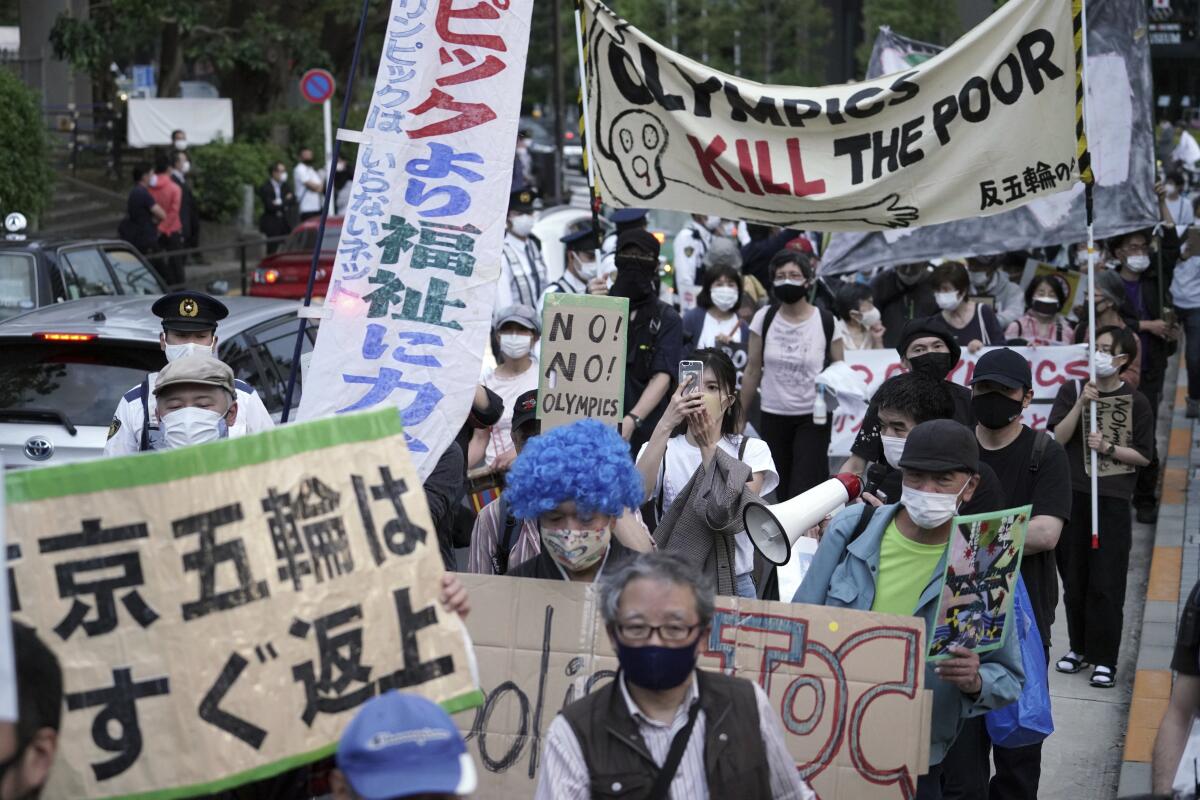
International Olympic Committee Vice President John Coates said last week the Games would “absolutely” go forward, even if Tokyo remains in a state of emergency at the time of the opening ceremony July 23. Tokyo and nine other regions of Japan, covering about 40% of the population, are currently under states of emergency, with restrictions on travel and business hours.
“I know from my own athletes in Australia how appreciative they are of the efforts of the Japanese people to give them the opportunity to live their dream, despite the current situation,” said Coates, who is also president of Australia’s Olympic committee.
Prime Minister Yoshihide Suga has said the decision ultimately rests with the IOC, prompting criticism that he was dodging responsibility for the safety of the Japanese people. His approval ratings have dropped this month to just over 30%, the lowest since he took office in September.
The official budget for the Olympics is $15.4 billion, but Japanese auditors estimate the real cost to be more than $25 billion, the bulk of which is borne by the country’s taxpayers. If the Games are canceled, insurance payouts would likely cover less than $3 billion. Most of the broadcast revenue goes to the IOC, with the host nation recouping costs through ticket sales and tourism dollars — which remain in doubt given the ban on overseas spectators.
“It is the duty of democratically elected officials to consider the democratic opinion of the nation, the people,” Katsumi said.
It’s a sentiment reflected in a provocative ad appearing this month in three major newspapers by a Tokyo publishing company, criticizing the government’s coronavirus response. The ad depicts World War II-era schoolgirls training to fight. The image is black and white except for a crimson coronavirus orb in the center — evoking memories of a population enlisted in a losing battle and left by its leaders to suffer the consequences.
“No vaccines. No medications. Are we supposed to fight with bamboo spears? If this goes on, we will be killed by politics,” reads the ad by magazine publisher Takarajimasha.
Iwamoto, the 93-year-old, who has lived through both the devastation of war and the excitement of the 1964 Tokyo Olympics, said he sympathized with the analogy.
“This isn’t a war fought on battlefields, but everyone around the world is fighting against it,” he said. “Amidst that, the thinking that we should go ahead with the Olympics is just strange.”
New variants of COVID-19 are spreading across Asia, reversing the success of governments such as Taiwan, Singapore, Vietnam and Thailand. Japan’s new outbreak is amplifying calls to cancel the Summer Olympics.
As a physician and former president of Doctors Without Borders in Japan, Nobuko Kurosaki, 64, volunteered to treat the the war-wounded in Iraq and Syria. Now, she and her colleagues in Nagasaki Prefecture are working extra shifts to vaccinate the elderly, who make up about 30% of Japan’s population.
The Japanese government has pledged to finish vaccinating the elderly by the end of July, but 15% of municipalities have said they don’t expect to meet the deadline.
Kurosaki said that at the beginning of the year, she thought the Olympics could be carried out safely, but not anymore. More than 70% of Japan’s 12,000 COVID-19 deaths — far fewer than many countries in the West, but high compared to its East Asian neighbors — have occurred this year.
“If the Japanese government wanted to hold the Olympic games, they should have accelerated vaccinations and had stricter rules. But they didn’t,” she said.
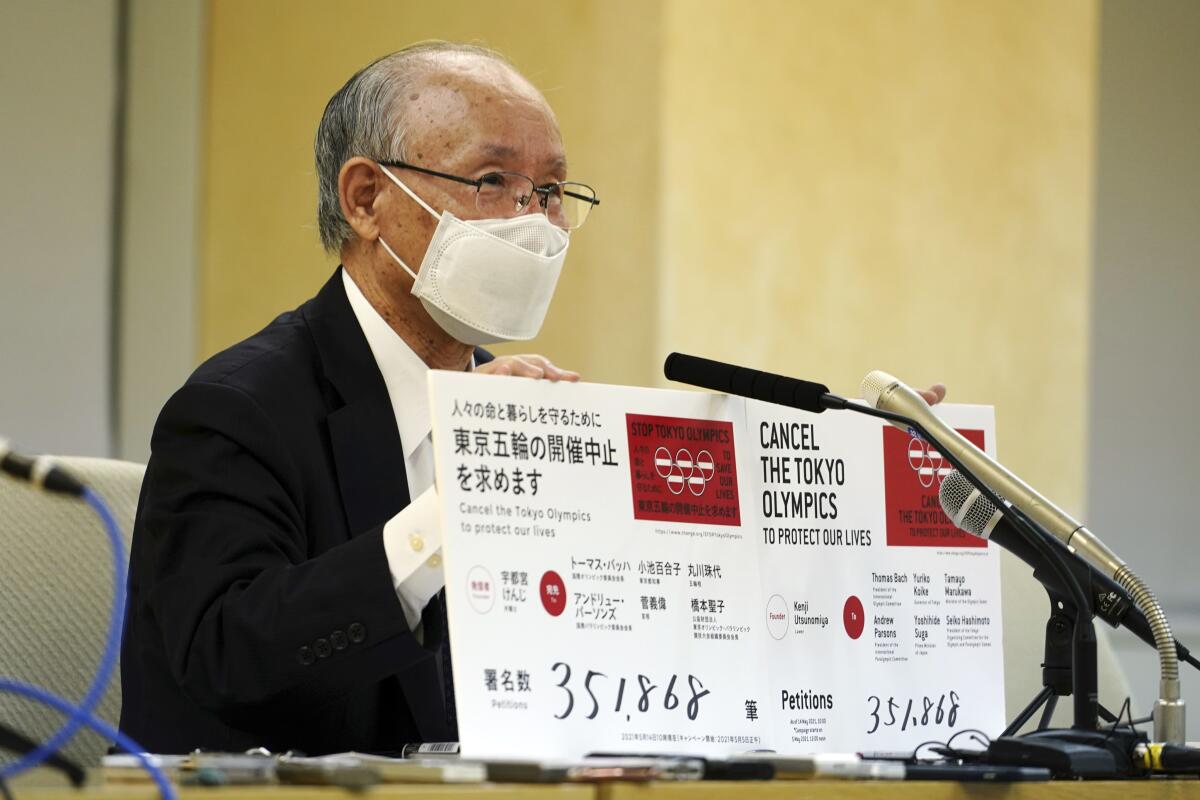
Lately, she and fellow doctors have been discussing the possibility of a fifth wave arriving in the midst of the Olympics. She finds herself imagining the country having to abruptly stop the Games midway through, with the whole world as a witness.
Kenshin Takada, for one, is hoping the Games go forward — even if it’s without a single spectator watching. The 21-year-old college student has been looking forward to the Olympics since Tokyo was chosen to host.
“I have been excited knowing that Tokyo is going to host the Olympics for the past eight years, so my desire for them to hold it is quite strong,” said Takada, who is one of 80,000 volunteers for the Games.
Even though he isn’t concerned about his personal health, he said he would be worried about giving the virus to his parents, with whom he’d be staying to commute to the Olympics. There is no current plan to vaccinate Olympics volunteers who don’t fall into priority age groups.
But if nothing else, Takada said, he and his classmates are looking forward to something that would break up the monotony that has defined life under the pandemic and ruined their final year as students.
“I feel very strongly that I would like to still take part,” he said.
More to Read
Sign up for Essential California
The most important California stories and recommendations in your inbox every morning.
You may occasionally receive promotional content from the Los Angeles Times.
